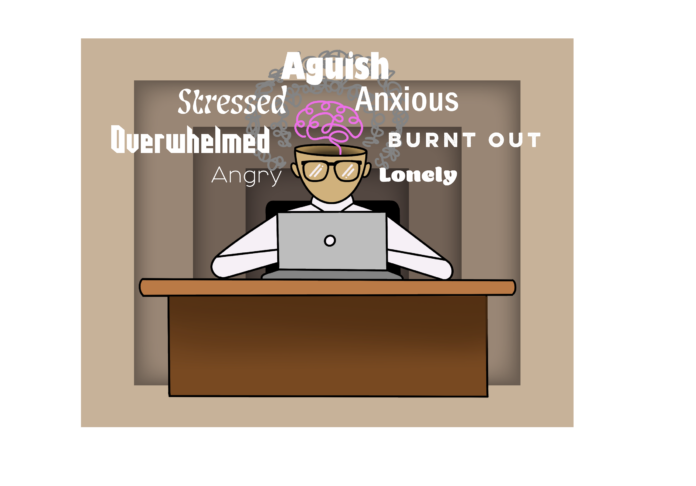
The mental health of professors and other faculty members is an important but sometimes disregarded part of higher education. The next generations’ minds are being molded by these instructors, who form the foundation of our institutions and universities.
Yet, their mental health is rarely addressed or given priority. A professor’s life is a never-ending balancing act in which they attempt to balance personal and professional obligations while dealing with the added stress of managing a frequently hypercompetitive setting.
The system assumes that these academics are mature, skilled, and resilient enough to handle the pressures of the position. Although working as a professor at a university might be one of the most rewarding careers, it has also evolved into one of the most demanding occupations. We must make an effort to comprehend the pressing need to recognize and comprehend the mental health issues experienced by these instructors.
The academic atmosphere is rigorous due to the demands of research, teaching, and administrative responsibilities. The relentless chase of publication, tenure-track posts, and research funding might be too much for many teachers. The conversation surrounding student mental health has gained traction in recent years, inspiring significant efforts and the allocation of funding to address it. For professors and other academic members, it is impossible to make the same claim.
Nearly two-thirds of academics reported having mental health problems, such as anxiety, psychological discomfort, depression, and burnout at some time in their careers. However, there is a case to be made that teachers chose this path knowing the challenges it implied.
While this is true, it’s important to understand that these people are not exempt from the strains of their line of work. Even the most devoted academics may experience stress from the constant need to perform at the highest level and uphold strict standards.
Moreover, the culture of overwork in academics is well-known. Professors sometimes find themselves juggling a variety of duties outside of teaching, such as counseling students, serving on committees, and handling administrative duties. Burnout can result from this ongoing strain. A study from the American Educational Research Association found that teachers in the U.S. are 40% more likely than healthcare workers, 20% more likely than office workers, and 30% more likely than people in other professions like farming and the military to experience symptoms of anxiety.
It’s critical to realize that when academic staff members and professors have mental health issues, it may have a ripple effect on the entire educational environment. Teachers who are stressed out and overworked might not be able to give their students adequate learning opportunities. This runs counter to the fundamental goal of academics and lowers the overall quality of education.
Universities and colleges must take the initiative to address this issue proactively. The culture around mental health must be honest and stigma-free first and foremost. Staff members and professors should feel free to talk about their problems and ask for assistance when necessary. This necessitates a change in the conventional mentality that associates weakness with vulnerability.
Institutions can also provide resources like mental health courses and counseling services that are specifically catered to the requirements of teachers. To guarantee professors have a healthier work-life balance, regulations governing task allocation need to be updated. The value of a good work-life balance should be taken into account when determining tenure and promotion standards.
It is crucial to have both administrative and peer support. Collaboration and experience sharing among faculty members should be promoted to build a sense of belonging and comprehension. On the other hand, administrators need to be able to spot the symptoms of stress and burnout and take appropriate action.
It is not only morally required, but also practically necessary. An organization that disregards the needs of its teachers endangers the standard of education it offers and runs the risk of losing precious talent to attrition and burnout.
These committed teachers have a significant influence on the future, and their health directly affects the standard of education we expect to be provided with. It is up to all of us to foster an atmosphere where they may grow both personally and professionally, which will eventually serve the interests of the whole educational community. By giving our educators’ mental health the attention it deserves, we not only recognize their achievements but also secure a better future for later generations.
For comments/questions about this story DM us on Instagram @thewhitatrowan or email thewhit.opinioneditor@gmail.com.





